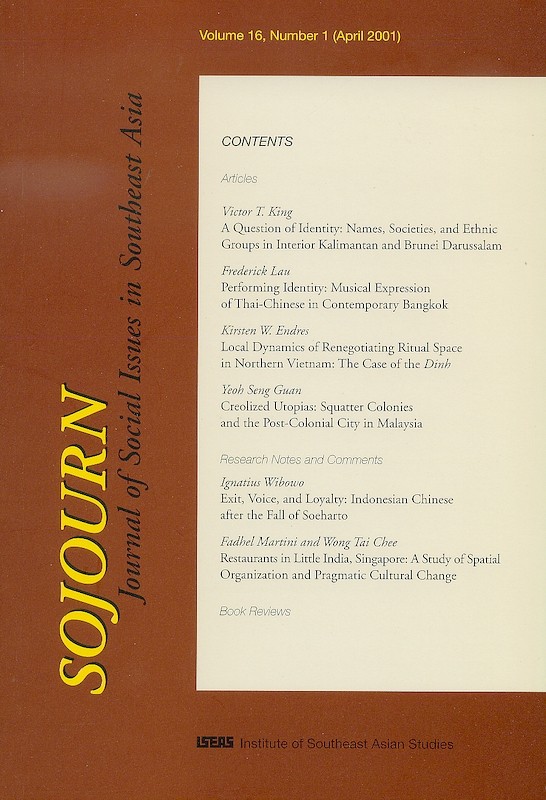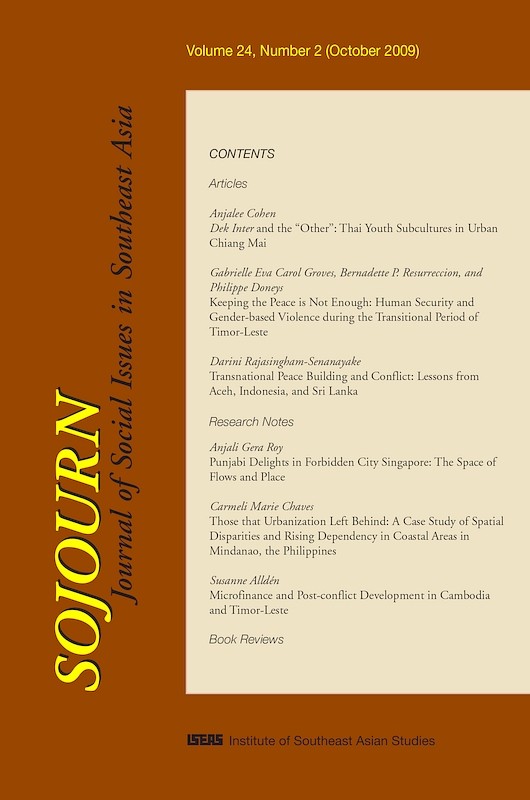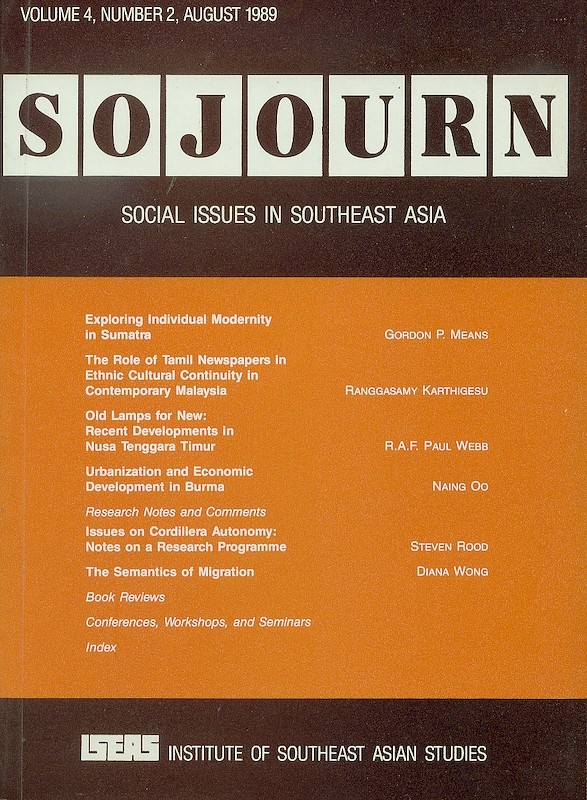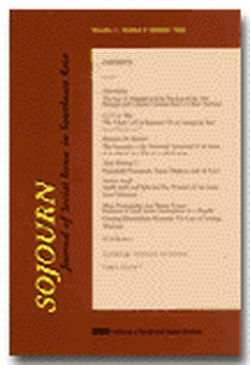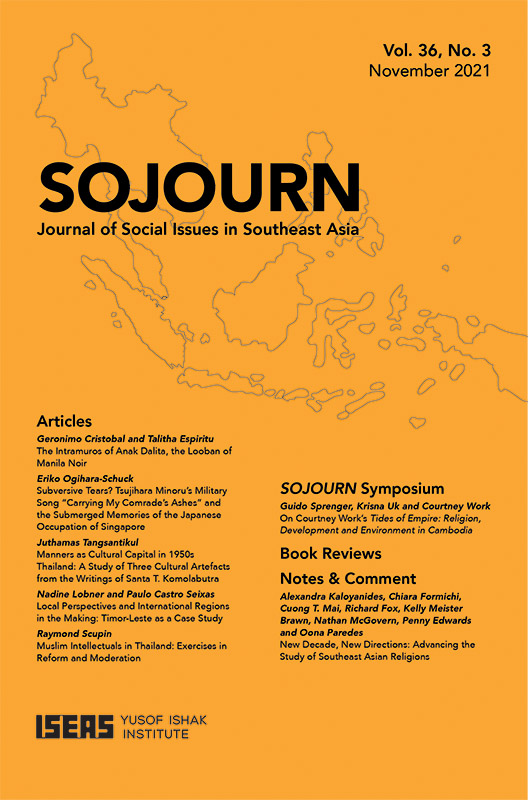SOJOURN: Journal of Social Issues in Southeast Asia Vol. 5/1 (Feb 1990)
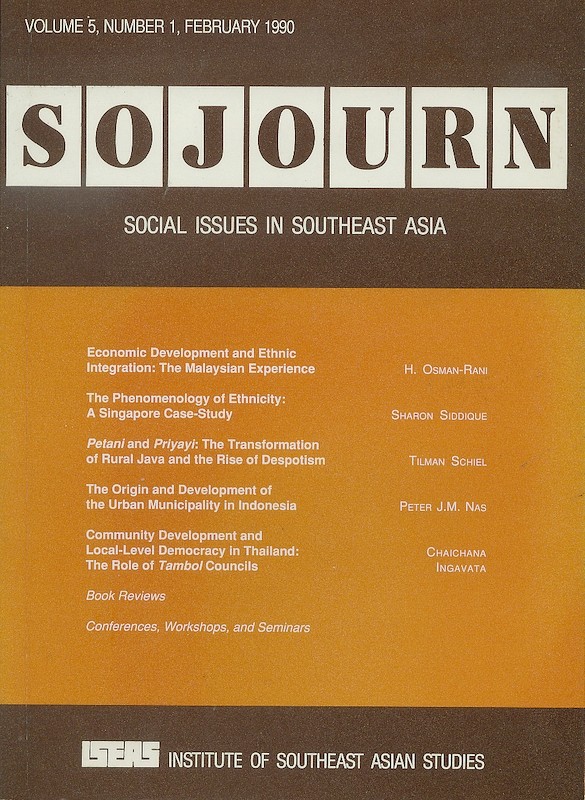
Date of publication:
February 1990
Publisher:
Institute of Southeast Asian Studies
Number of pages:
162
Code:
SJ5/1
Contents
-
Preliminary pages
- ARTICLES
-
Economic Development and Ethnic Integration: The Malaysian Experience, by Hassan Osman-Rani, author see abstractThe purpose of this paper is to examine and evaluate the extent to which the New Economic Policy (NEP) has been effective as an instrument for national integration in Malaysia. Based on a comparison of the situation before and after the implementation of the NEP, it is argued that although national development has been moving towards the achievement of the NEP objectives, ethnic tensions and conflict remain serious. While economic factors are important in preventing ethnic conflict, they are not sufficient to promote ethnic integration.
-
The Phenomenology of Ethnicity: A Singapore Case-Study, by Sharon Siddique, author see abstractOne possible approach towards understanding the topical relevance of the CMIO (Chinese, Malay, Indian, and Others) racial categories in Singaporean everyday life is to focus on a small group of individuals and describe how they make sense of ethnicity in particular situations. A three-generational family which is characterized by inter-racial marriages has been chosen to illustrate this approach. Choosing a family whose members find identification with one of the CMIO categories ambiguous, if not problematic, raises new insights and issues concerning two complex processes: first, how family members negotiate their ethnic identities, and second, how the institutionalization of ethnicity has affected this process over time.
-
Petani and Priyayi: The Transformation of Rural Java and the Rise of Despotism, by Tilman Schiel, author see abstractThe "closed corporate village community" is a widely accepted ideal type for understanding traditional peasant society. The existence of the "typical" corporate village, is, however, questionable and it is suggested that villages may be more usefully viewed as open systems within a greater sociopolitical environment. The village as a small-scale social system in a larger sociopolitical environment, partly shaped by the state, may adapt to changes in this environment. Accordingly, corporate villages may assume different forms depending on state development. This article examines these and other related issues through a consideration of quite different forms of corporate villages, the role of trade, different forms of the state as well as changing notions of the state and how they were applied in colonial times, with particular reference to Java.
-
The Origin and Development of the Urban Municipality in Indonesia, by Peter J M Nas, author see abstractThe meaning attached to the city is placed centrally in the works of Castells. According to him, cities are liable to change because all sorts of parties are permanently struggling over the meaning the city should have. He defines urban meaning as the structural performance assigned as a goal to cities in general (and to a particular city in the inter-urban division of labour) by the conflictive process between historical actors in a given society. This article about the origin and development of the Indonesian municipality deals precisely with the meaning of urban attached to the Indonesian town by all sorts of categories of people at various levels over the years. This concerns a long-term process in which a lot of interests and goals have been at stake, such as financial cuts, administrative decentralization, the promotion of local interests, nation-building, security, repression, and the promotion of self-interests.
-
Community Development and Local-Level Democracy in Thailand: The Role of Tambol Councils, by Chaichana Ingavata, author see abstractThe sapha tambol is a local-level institution with a history dating from 1956. Conceived as an institution for fostering "grass-roots democracy", it has undergone several modifications. This article examines several issues in the role of the sapha tambol with reference to the part played by local "elites" and local-level
- BOOK REVIEWS
-
BOOK REVIEW: Cities and Towns un Indonesia: Their Development, Current Positions and Functions With Regard to Administration and Regional Economy. Edited by Werner Rutz. Urbanization of the Earth (Urbanisierung der Erde) Series no. 4, edited by Dr Wolf Tietze., by Sharon Siddique, author
-
BOOK REVIEW: Burma: A Study Guide. Edited by Ronald A Morse and Helen L Loerke., by U Thaw Kaung, author
-
BOOK REVIEW: Prolonged Connections: The Rise of the Extended Family in Nineteenth-Century England and America. Edited by Steven Ruggles., by Yap Mui Teng, author
- CONFERENCES, WORKSHOPS, AND SEMINARS
-
Conference on Thailand: Aspects of Thai Identity, 1939-89, 8-9 September 1989, Melbourne; Workshop on the Urban Future of Southeast Asia, 9-10 November 1989, Singapore

